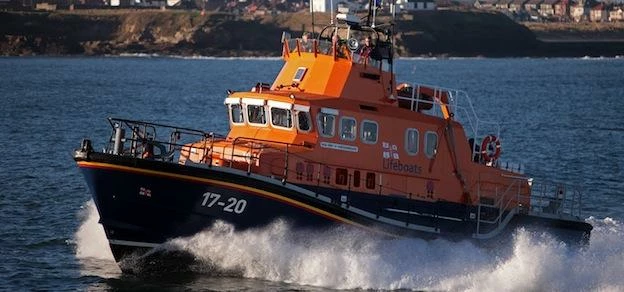
Partner Article
Newcastle University begin four year project with RNLI
How all-weather lifeboats are designed is set for a re-evaluation as part of a major study being led by Newcastle University and the Royal National Lifeboat Institution (RNLI), with support from Lloyds’ Register.
Investigating how new technology, materials and approaches can be used to improve the design, operation and maintenance practice of the RNLI’s Severn Class lifeboat, the four-year project will help to improve the performance of the craft while providing the safest possible environment for the RNLI’s volunteer crews.
Using computer models, small scale experiments and full-size trials to analyse the behaviour of lifeboats at a range of speeds and in varying conditions, the findings will inform new design specifications around speed, safety and efficiency.
Richard Birmingham, Professor of Small Craft Design in Newcastle University’s School of Marine Science and Technology and the Principal Investigator on the project, said: “The ability to safely perform at high speed and in extreme conditions is not only imperative for the safety of the volunteer crew but also has a direct effect on the efficiency and reliability of the search and rescue service.
“Designing a boat that is capable of travelling safely at greater speed and under the most extreme conditions, means a better response to emergency call-outs and less transit time to reach the casualty.”
Project lead Federico Prini, research associate at Newcastle University’s School of Marine Science and Technology, said: “When the RNLI’s lifeboats travel at speed and in rough seas, they can be subject to frequent and significant slamming as the boat crashes against the waves.
“Measuring these forces and the resulting impact on the vessel is crucial in order to design a craft that is capable of withstanding the loads experienced during rescue operations.
“That is what we are setting out to do – using the latest technology and equipment here at Newcastle University.”
Looking to promote your product/service to SME businesses in your region? Find out how Bdaily can help →
Enjoy the read? Get Bdaily delivered.
Sign up to receive our daily bulletin, sent to your inbox, for free.








 Raising the bar to boost North East growth
Raising the bar to boost North East growth
 Navigating the messy middle of business growth
Navigating the messy middle of business growth
 We must make it easier to hire young people
We must make it easier to hire young people
 Why community-based care is key to NHS' future
Why community-based care is key to NHS' future
 Culture, confidence and creativity in the North East
Culture, confidence and creativity in the North East
 Putting in the groundwork to boost skills
Putting in the groundwork to boost skills
 £100,000 milestone drives forward STEM work
£100,000 milestone drives forward STEM work
 Restoring confidence for the economic road ahead
Restoring confidence for the economic road ahead
 Ready to scale? Buy-and-build offers opportunity
Ready to scale? Buy-and-build offers opportunity
 When will our regional economy grow?
When will our regional economy grow?
 Creating a thriving North East construction sector
Creating a thriving North East construction sector
 Why investors are still backing the North East
Why investors are still backing the North East